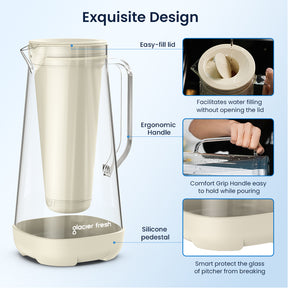Pitcher of Water
That's interesting. Don't watch what happens next pitcher of water. When it comes to choosing the right pitcher for your water needs, the options can be overwhelming. From filtering capabilities to design and size, there are various factors to consider. In this article, we will explore the different types of pitchers available in the market and help you determine which one is perfect for your water needs. 
Understanding Your Water Needs
Before delving into the types of pitchers, it's essential to understand your water needs. Do you live in an area with hard water? Are you looking to remove specific contaminants? By identifying your requirements, you can narrow down the pitcher options that best suit your needs.
Types of Pitchers
There are several types of pitchers available, each with its unique features and benefits. Some pitchers use activated carbon filters to remove impurities, while others utilize ion exchange resins to soften water. Additionally, there are pitchers with UV filters that target bacteria and viruses. Understanding the different types of pitchers and their filtration methods is crucial in making an informed decision.
Activated Carbon Filters
Activated carbon filters are commonly used in pitchers to remove impurities such as chlorine, sediment, and volatile organic compounds (VOCs) from water. These filters work by adsorption, where the impurities adhere to the surface of the carbon. If your primary concern is improving the taste and odor of your water, a pitcher with an activated carbon filter may be the perfect choice for you.
Ion Exchange Resins
Ion exchange resins are effective in reducing the hardness of water by replacing calcium and magnesium ions with sodium ions. If you live in an area with hard water and are looking to minimize limescale buildup, a pitcher with ion exchange resins could be the ideal solution for your water needs.
UV Filters
UV filters use ultraviolet light to disinfect water by deactivating bacteria, viruses, and other microorganisms. If you are concerned about microbiological contaminants in your water supply, a pitcher with a UV filter can provide an added layer of protection, ensuring that your water is safe to drink.
Considerations for Choosing the Right Pitcher
When selecting a pitcher for your water needs, there are several factors to consider. The size of the pitcher, the speed of filtration, the cost of replacement filters, and the overall design are all important aspects to evaluate. For example, if you have a large household, you may require a pitcher with a higher capacity to ensure an adequate supply of clean water.
Furthermore, the speed of filtration can vary among pitchers, with some offering faster filtration rates than others. If you prioritize convenience, opting for a pitcher with a rapid filtration process may be beneficial.
Cost is another significant consideration, as replacement filters can contribute to the long-term expenses of owning a pitcher. It's essential to factor in the cost of replacement filters and the frequency of replacement when making your decision.
Conclusion
Exploring different types of pitchers and determining which one is perfect for your water needs requires careful consideration of your specific requirements and the features offered by each pitcher. By understanding the filtration methods, considering your water needs, and evaluating the various factors involved in choosing a pitcher, you can make an informed decision that ensures access to clean, great-tasting water for you and your family. References
|